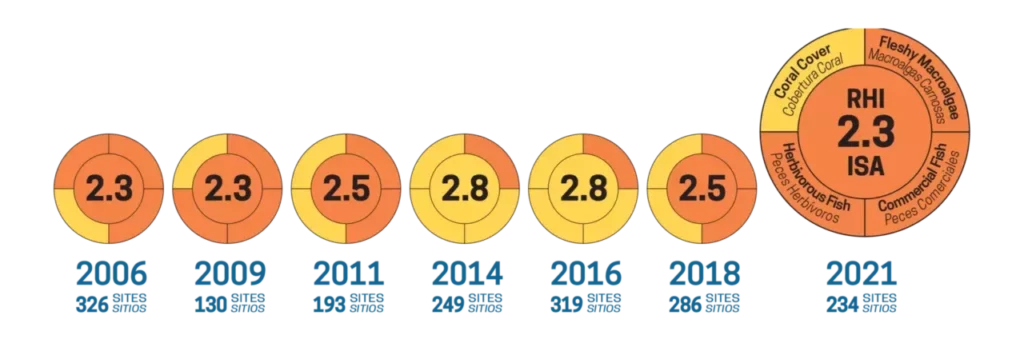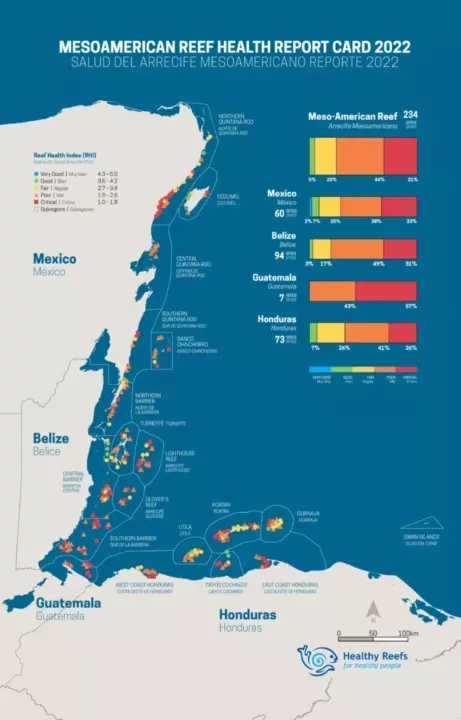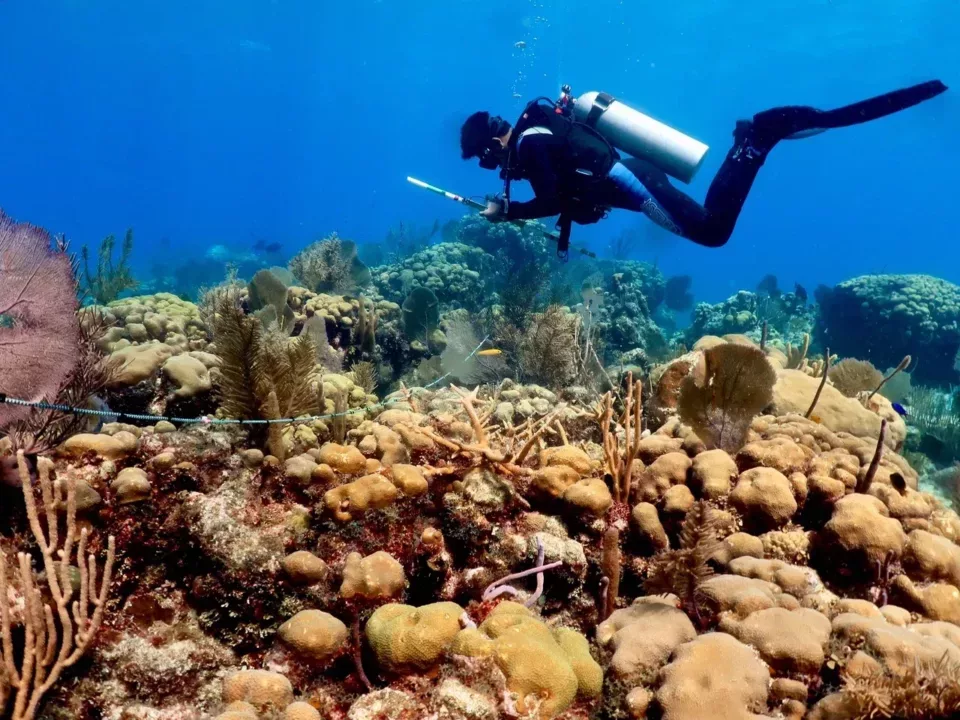December 14, 2022: Less than ten percent of the Mesoamerican Reef coral reef area is fully protected from fishing, with three out of four countries now having critically low grouper and snapper biomass. Reefs like Cozumel, Mexico – that are fully protected and enforced – demonstrate their capacity for sustainable use and resiliency.
MESOAMERICAN REEF — The 2022 Report Card on the Health of the Mesoamerican Reef was released on December 14, 2022, by the Healthy Reefs Initiative (HRI), a collaboration of over 70 organizations dedicated to the conservation of the Mesoamerican Reef (MAR) in Mexico, Belize, Guatemala and Honduras. It reveals that reef health has dropped for the second time – reaching the same “Poor” rating (2.3 out of 5) that was first measured in 2006 and down from the “fair” rating (2.8) attained five years ago. These data come from 234 reef sites assessed with a standard methodology by 77 surveyors from 36 different organizations from June to December 2021.
The Mesoamerican Reef system includes four off-shore atolls, barrier, fringing and patch reefs encompassed within 1324 km2 of coral reef habitat distributed among 17 subregions, eight of which are now in critical condition for commercial fish biomass. Belize experienced the greatest decline in reef health caused primarily by the over 50% reduction in both commercial and herbivorous fish biomass, likely due to reduced enforcement and sustained fishing during COVID restrictions.
The Reef Health Report Card tracks four indicators to understand changes in reef health over time: live coral cover, fleshy macroalgae cover, the biomass of key herbivorous and commercial fish species. Reef Health can be assessed for each indicator or for the integrated Reef Health Index, which equally considers all four indicators. Evaluations can be considered at the site, subregion, country or full Mesoamerican Reef scale. In all these cases the message is clear – we urgently need to increase reef protection. Fish populations are now critically low in every country, except Mexico. Most of the 17 subregions are in “poor condition”, with Cozumel, Mexico as the only subregion in ‘good’ condition for overall reef health. Interestingly, Cozumel also has the highest percent of its coral reef area within full protection from all fishing (35%) and is the only subregion with ‘very good’ condition for commercial and herbivorous fish. These data demonstrate the value of full protection, particularly when local communities are involved in management and are benefiting economically.
Maria José González, Executive Director of the Mesoamerican Reef Fund said, “This 2022 Report Card is sobering and an immediate call to action. The International Development Bank’s 2021 economic valuation of the Mesoamerican Reef found it provides goods and services valued at about US$4.5 billion per year, which we stand to lose if we allow the reef to further decline. We need to turn this threat into an opportunity to engage the private sector and innovate more market-based initiatives that will reduce the threats to the reef and generate income for local communities. Inaction is not an option.”
The four MAR countries have designated over 50 MPAs that cover 56% of the territorial waters in the MAR. Most are actively managed. But most of the MPAs still allow fishing – only 2.4% of the territorial waters are in full protection – ranging from 1.8% in Belize to 12% in Guatemala. “We are eager to study the ecological response and potential recovery of fish populations in Guatemala, after declaring our first fully protected reef area in the amazing Cayman Crown reef in 2020” said Ana Giró, HRI’s Coordinator for Guatemala.
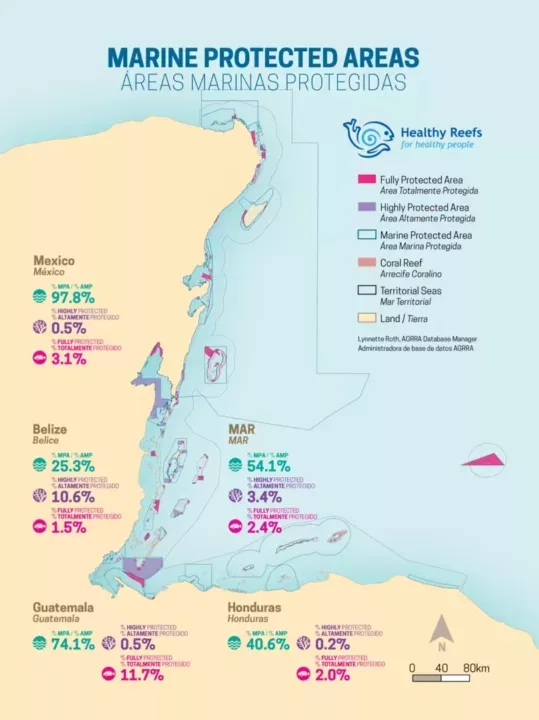
This is the seventh HRI Report Card issued since 2008, with all of them including the recommendation to put 20% of the sea under full protection from all fishing, in order to replenish heavily exploited populations and restore the reef’s complex ecological functioning. “We talk a lot about Marine Protected Areas (MPAs), and allocate considerable financial resources for their management,” said Dr. Melanie McField, Director of HRI and a Smithsonian coral reef scientist with over 30 years experience working in the region. “ We now need this protection to become absolute, along with our resolve to enforce it.”
The percent of the coral reef habitat under full protection is somewhat better, with 9% region wide, ranging from 7% in Belize to 15% in Mexico. Notable is that Mexico is also the only country whose commercial fish biomass is not in critical condition. Full protection will help sustain the fisheries and reef health. Increasing this to 20% could further enhance and support the fisheries outside the fully protected zones due to the exponential increase in offspring produced by “big mamma” fish within the fully protected zones. “If we had actually placed 20% of the MAR under full protection 15 years ago when we first recommended it, the region would now be reaping the benefits of more productive fisheries, improved reef health and increased tourism value in the fully protected zones,” McField said.
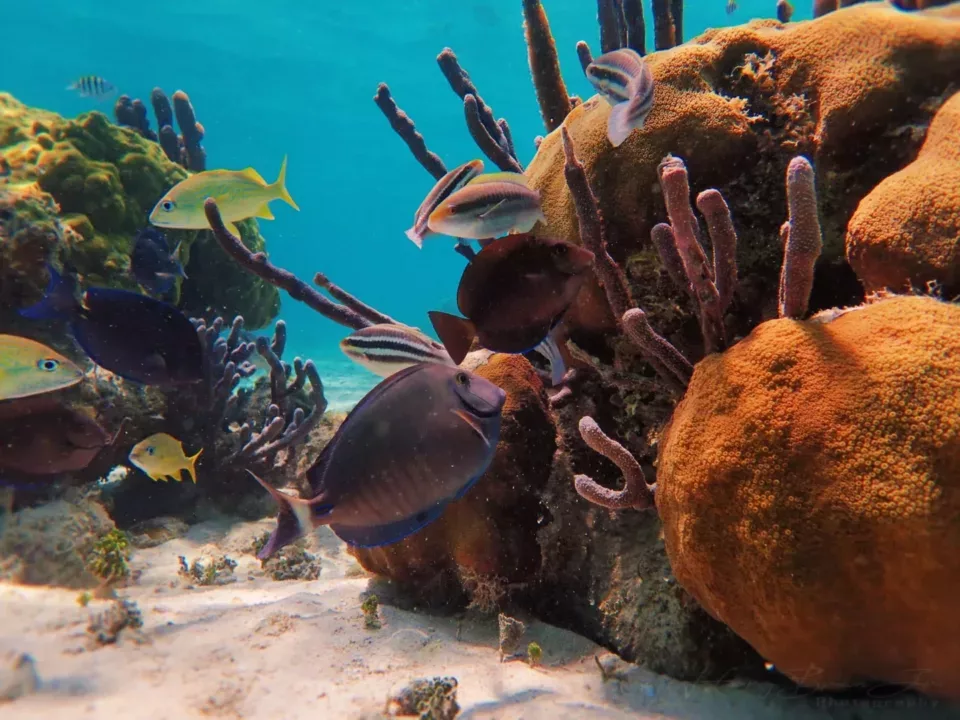
While fish decline is the main issue highlighted in this report, we continue to deal with high levels of fleshy macroalgae that can impede coral growth and reproduction. Additionally, while coral cover has remained relatively stable, threats such as stony coral tissue loss disease and climate change have impacted coral communities and reduced their diversity. We have lost 44% of our reef building boulder corals, leaving space for more opportunistic, non framework building species and macroalgae. This change in species composition translates to reduced growth and lower calcium carbonate accretion (our coral’s building blocks) making our reefs highly susceptible to erosion and other impacts, reducing their services such as coastal protection and resiliency.
This precarious balance for the coral community is particularly evident in Mexico and Honduras, where even total live cover has declined since our last assessment. “Our state continues to face the challenges of balancing economic development with the integrity of our most fragile ecosystems such as coral reefs, however, one cannot exist without the other. The goal of our government is to consolidate sustainable growth that conserves and restores our ecosystems with a social commitment to our communities so that no one is left behind. We congratulate and join the great work carried out by HRI for our reefs,” said Huguette Hernández, Secretary of Ecology and Environment of the Government of the State of Quintana Roo (SEMA).
We know that escalating stress from global climate change and disease outbreaks are now impacting our reef, while the decades-old problems of sewage and agricultural nutrient pollution continue to fuel macroalgal proliferation and pathogens. Thus, our reef is being assaulted on many fronts and our meager defensive tactics are languishing. We need bold offensive strategies to propel reefs into a better ecological condition – by actually managing our wastewater and agricultural runoff, controlling coastal development, increasing reef herbivory, and restoring commercial fish by implementing fully protected zones to replenish critically depleted populations.
“With the increasing threats confronting the MAR, this Report Card provides an urgent call to action and persistent reminder that these ecosystems need more protection. It also provides the baseline from which we can assess the impact of our conservation and management efforts,” said Dr. Jake Snaddon, Director of the University of Belize Environmental Research Institute.
Governments need to commit to fully protect at least 20% of the sea, as the core of the 30% highly protected that is part of the 30X30 commitments; municipalities and businesses need to invest in adequate sewage treatment, while governments and communities need to collaborate to prevent massive coastal developments with irreparable ecological and social damages. Finally, we all need to become more politically engaged in these decisions and reduce our individual carbon footprints by adopting more sustainable lifestyles, particularly our food/protein choices.
Source: Healthy Reefs Initiative Press Release – December 14, 2022

